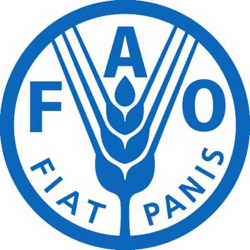
Food and Agriculture Organization Logo
Basseterre, Saint Kitts – Nevis
June 03, 2008 (CUOPM)
St. Kitts and Nevis Prime Minister Hon. Dr. Denzil L. Douglas has called for the suspension of the protocol with the World Trade Organization (WTO) to allow Member Countries to produce more local agricultural products.
Addressing the United Nations Food and Agriculture Summit on World Food Security: the Challenges of Climate Change and Bioenergy, in Italy on Tuesday, the St. Kitts and Nevis Leader also called on the FAO (Food and Agriculture Organization of the United Nations) to assist Member Countries with seeds, fertilizer and other inputs to assist the farmers to carry out a rapid production of agricultural products.
“We need help and we need it immediately,” Prime Minister Douglas told the several Heads of State and Government as well as numerous Ministers of agriculture, forestry, fisheries, water, energy and environment.
Dr. Douglas also said there was an urgent need to develop measures to ensure that the adverse effects of the higher food prices on the poor are minimized and that sustainable measures are developed and implemented to reduce poverty.
He said that policy makers have a critical role in ensuring that bioenergy is developed in a sustainable manner thereby safeguarding food security and ensuring that the benefits reach the poor and those who are food insecure.
“Policy priorities would include safety nets to mitigate impacts of higher food prices on the poor and food insecure and the promotion of bioenergy policies that are environmentally sustainable and would foster market opportunities for small holders and other vulnerable groups,” said the St. Kitts and Nevis leader.
Dr. Douglas said that climate change is expected to impose new challenges to arable land areas, livestock rearing and fisheries and urged agreement on the actions that are necessary to achieve climate-responsive food security policies and programmes.
“There is need for greater investment in agriculture and rural development so that the world’s poor can develop their potential to improve their nutrition and incomes,” said Prime Minister Douglas.
He hoped that the Summit on World Food Security would be able to effectively address the many food security issues that have arisen as a result of soaring food prices and food shortages as well as the several new challenges of climate change and energy security.
“The high cost of oil prices has certainly affected food prices and calls for special and differential measures for the small island states of the Caribbean,” said Prime Minister Douglas.
He said that the dramatic increases in food prices within recent months are worsening the living conditions of millions of poor people many of whom live on less than a dollar a day.
“Poor people generally spend more than half of their income on food and the rapid increases in food prices that we are currently experiencing make their ability to consume nutritious foods even more challenging,” said Prime Minister Douglas.
Since January 2008, the FAO Food Price Index jumped by 47 percent from the previous year which included increases in cereals by 62 percent, dairy by 69 percent and vegetable oils by 85 percent.
“We have also seen that the prices of staple foods such as maize, wheat, rice and beans have in some cases risen by more than 100 percent. Not only have world food prices risen sharply but there have also been serious shortages of rice, wheat and maize. This has created the worst food crisis in recent years for the entire world including Latin America and the Caribbean,” said Prime Minister Douglas, who added that the current high food prices makes it even more challenging for us to achieve the first of the Millennium Development Goals which is to reduce by half extreme poverty and hunger in the world by 2015.
Dr. Douglas noted that in the Caribbean, the current food crisis has resulted in dramatic food price increases as well as shortages of staples. The shortage has also caused food riots and even deaths (Haiti) and has threatened the survival of people and vulnerable communities.
“The Caribbean, though a significant producer, is a net importer of food. In many ways this has been influenced by our eating habits that have moved away from the consumption of local to imported foods. There is therefore an urgent need for product transformation of locally grown foods into forms that are more easily acceptable by our people. Simultaneously there is also a need to adjust our eating habits and consume more locally grown food,” said Prime Minister Douglas.